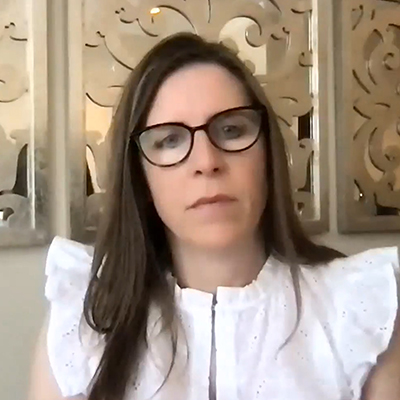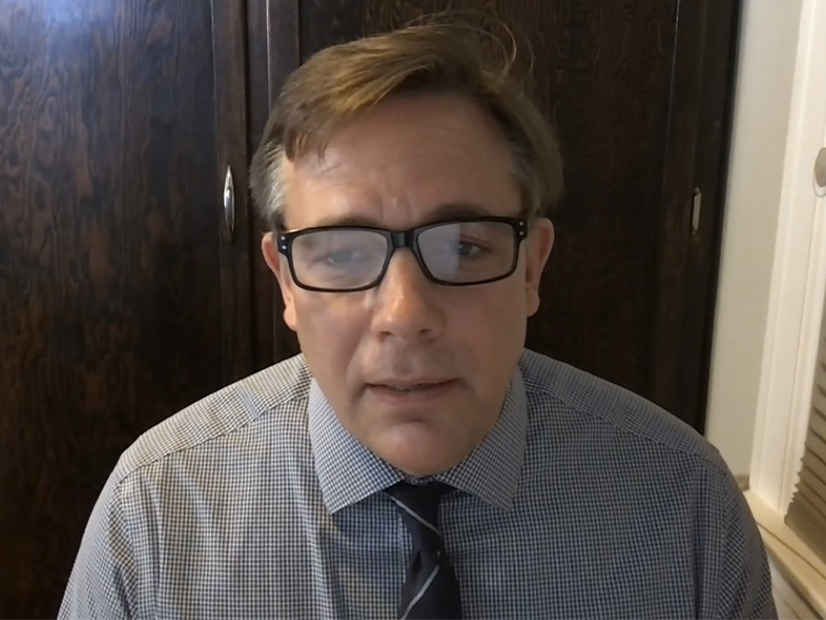Sponsors of Illinois’ Climate and Equitable Jobs Act (CEJA) condemned “foot dragging” by MISO in getting new renewable energy online to fix its capacity crisis during a press teleconference Thursday.
State lawmakers and a representative for consumer advocate Citizens Utility Board (CUB) said with a climate crisis escalating quicker than scientists predicted and energy prices climbing sharply, MISO should re-evaluate and revamp its interconnection rules to accelerate new renewable capacity interconnections.
They said the grid operator is sitting on 34 renewable projects for the state that are capable of powering 4.5 million homes “while the grid operator blames others, spreads fear.”
The news conference comes as some critics are calling to reopen CEJA’s provisions given the capacity shortages. The legislation requires Illinois to be reliant on 100% renewable energy by 2050.
 Illinois Rep. Ann Williams | Illinois Clean Jobs
Illinois Rep. Ann Williams | Illinois Clean Jobs
Illinois Rep. Ann Williams (D) opened the press conference by referencing Vistra CEO Curtis Morgan’s 2019’s pronouncement that coal was on its way out.
“It was an admission to us and to the state of Illinois that coal could not compete with clean solar and wind energy. Now, gas is following coal into the land of polluting, expensive fuels of the past,” she said.
Williams said Illinois “saw the future” and enacted CEJA.
“But we write the laws. We don’t operate the grid. That’s MISO’s job,” she said.
Williams said rather than bringing clean energy on the grid as quickly as possible, “MISO is addressing concerns about capacity by trying to shift blame.”
“Fossil fuel interests and entrenched energy lobbies are jumping on the blame game and calling for a return to the days when coal and gas generated Illinois’ electricity, even as fossil fuel prices skyrocket, emissions continue to pollute our communities and our planet is burning,” she said. “Going back to coal and gas is like pouring gas on a fire, in terms of hiking energy prices up and polluting our communities.”
Fossil fuel prices are only becoming more expensive, made worse by Russia’s war in Ukraine, Williams said. She challenged MISO’s “lackluster approach” to bringing new renewable energy online.
“You can’t do what you’ve always done and expect it to solve a problem you’ve never encountered before, but that’s what’s happening. … MISO needs to operate with a sense of real urgency here [and] think outside the box to meet the moment that we are in,” Williams said of the RTO’s system of processing and studying interconnection requests.
MISO’s 2022-23 Planning Resource Auction (PRA) failed to secure enough capacity in its Midwestern zones, which cleared at a $236.66/MW-day cost of entry for new generation. MISO Midwest now faces the possibility of rolling outages in the 2022-23 planning year, which began June 1. (See MISO’s 2022/23 Capacity Auction Lays Bare Shortfalls in Midwest.)
Though the grid operator’s membership approached the auction with more capacity year-over-year, MISO said the resource additions were mostly intermittent and generally less available than retiring thermal generators. It said it will require dispatchable, natural gas generation well into the future.
MISO’s current generator interconnection queue contains 806 projects totaling 126.3 GW of capacity. The queue overwhelmingly is comprised of solar, wind and storage projects or a combination of renewable energy and storage. The RTO historically only interconnects about 20% of projects that enter the queue.
MISO executives have been making the rounds in front of state regulators and lawmakers to drive home the urgency to fix future capacity shortfalls. (See MISO Promises Stakeholder Discussions on Capacity Auction Reform.)
“Rather than do its job, which is to operate the grid and transition our energy needs, MISO is pointing fingers. … MISO, with more than 1,000 employees, can and should move faster to transition Illinois to renewable energy,” Illinois Sen. Cristina Castro (D) said.
Castro said while PJM has made the energy transition a priority, MISO “still stubbornly holds on to a backwards-looking fossil fuel system that is dirty and expensive.” She questioned the grid operator’s delay in reviewing and approving generation projects, saying it led to expensive and “phony” shortage pricing.
“If Ameren customers ever find themselves in the dark, MISO’s inaction is to blame. They are asleep at the wheel, asleep at the switch and dragging their feet,” Castro said.
“It’s time for MISO to let CEJA do its job,” said Jim Chilsen, director of communications for CUB.
Chilsen said he was “challenging MISO to show leadership” and speed up the approval process for capacity additions.
“MISO needs to make the transition away from expensive fossil fuels a bigger priority. This is largely a problem of planning. For years, MISO has known that the transition from dirty energy was coming,” Chilsen said. “MISO has been slow to respond to these developments over the years.”
Chilsen said CUB has seen a 20% increase in ratepayers contacting them over energy affordability concerns.
MISO spokesperson Brandon Morris said the RTO was aware of the virtual press conference and that it planned to review the event in its entirety.
“We look forward to thoughtfully responding to any concerns or questions raised,” Morris said in an emailed statement to RTO Insider.



